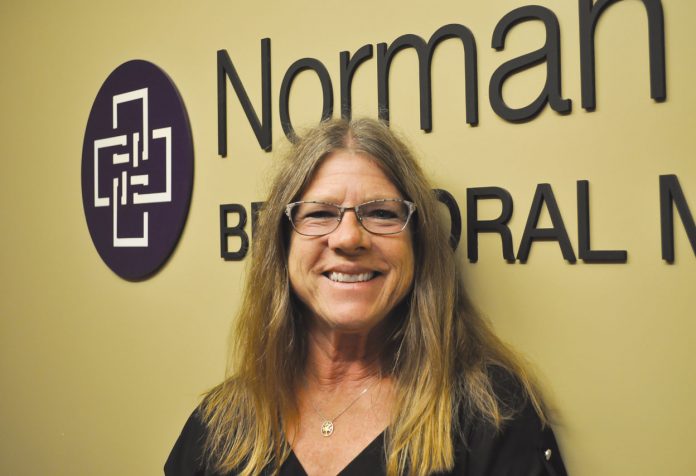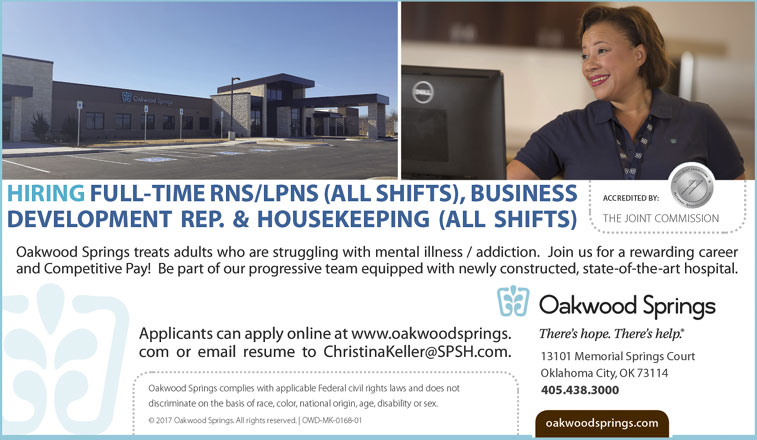
CAREERS IN NURSING
NURSING IS PART OF EVERY ASPECT OF LIFE: FAMILY HEALTH CARE
by Bobby Anderson – Writer/Photographer
When other nurses find out Barbara Hudson, RN, is a psychiatric nurse the conversation generally heads down a predictable path.
“How do you do that? I could never do that” are the comments that usually come Hudson’s way.
“I always tell them I could never be an ER nurse or an ICU nurse,” Hudson said.
For more than 30 years now Hudson has found peace deeply rooted in her role with Behavioral Medical Services at Norman Regional Health System.
She’s embraced a field that sends many nurses running and it was all by accident.
“I didn’t know there was such a thing as a psychiatric nurse,” Hudson admitted of her nursing school days.
A several week rotation at the VA Hospital opened her eyes to the prospect.
Hudson began in psychiatric nursing in Oklahoma City to start her career. Then circumstances changed and she came to Norman and worked one year on a medical-surgical floor.
“I think med-surg nurses are the ones that should get the most money because they have to know the most,” she says.
She’s enjoyed Norman Regional’s commitment to keeping a BMS unit even when funding began to dwindle.
“We’ve been open 33 years and many people in Norman don’t even know we exist,” Hudson said. “We’re the best kept secret in Norman.”
She praises the medical director for a thorough screening of patients before they come up to the unit.
A strict admission criteria rules out the possibility of obvious or potentially-violent patients coming upstairs.
Patients are not restrained and the unit has no isolation rooms.
Hudson’s unit has 20 beds with an average length of stay of around one week.
“The best part is getting to know these patients, their diverse lifestyles and knowing that they’re people just like me,” Hudson says. “Some of their strengths amaze me and how they can get better.”
Same goes for her nurses. As day charge, Hudson gets a chance to see her nurses shine.
“I think they’re wonderful,” Hudson said of her nurses. “It’s like a piece of a puzzle and our nurses have different strengths. The way we approach patients, we kind of compliment each other and that’s kind of neat.
“We’ve worked with each other long enough that in a situation if there is somebody they have rapport with they’re going to step in and deal with it.”
“I know they’ve got my back.”
Norman’s behavioral unit is steeped in experience. Three people have spent at least 30 years working the unit.
“We’re family,” Hudson says.
It’s a field that’s desperately needed.
According to Mental Health America, the nation’s leading community-based nonprofit dedicated to addressing the needs of those living with mental illness, the need for services in our country is increasing.
The organization’s annual Mental Health in America report spotlighted several trends including:
* 1 in 5 Adults have a mental health condition. That’s over 40 million Americans; more than the populations of New York and Florida combined.
* Youth mental health is worsening. Rates of youth depression increased from 8.5% in 2011 to 11.1% in 2014. Even with severe depression, 80% of youth are left with no or insufficient treatment.
* There is a serious mental health workforce shortage. In states with the lowest workforce, there’s only 1 mental health professional per 1,000 individuals. This includes psychiatrists, psychologists, social workers, counselors, and psychiatric nurses combined.
* Less access to care means more incarceration. Arkansas, Mississippi, and Alabama had the least access to care and highest rates of imprisonment. There are over 57,000 people with mental health conditions in prison and jail in those states alone. That’s enough to fill Madison Square Garden three times.
It’s not uncommon for patients to return to the BMS unit for treatment later on down the road. When that happens Hudson becomes their greatest cheerleader, stressing the progress they have made and still are making.
She calls those return visits “tune-ups” or “maintenance” and hammers home the point that there is no quick-fix for mental illness.
Maybe it’s why she likes that role instead of one on a medical-surgical unit.
But Hudson says reasons are more practical for not working outside of BMS.
“I can not do vomit, spit or diarrhea,” she laughed. I gag and I have to leave the room or I will be doing the same thing they’re doing. There’s more things but that covers a lot.”
Success is often concrete for Hudson and her patients.
“In that people say they can cope better and they aren’t going to kill themselves,” Hudson says of the measure of success. “It’s great.”

Oakwood Springs treats adults who are struggling with mental illness / addiction. Join us for a rewarding career and Competitive Pay! Be part of our progressive team equipped with newly constructed, state-of-the-art hospital.
Applicants can apply online at www.oakwoodsprings.com or email resume to [email protected].
Oakwood Springs
13101 Memorial Springs Court
Oklahoma City, OK 73114
405.438.3000
There’s hope. There’s help.
ACCREDITED BY:
THE JOINT COMMISSION
Oakwood Springs complies with applicable Federal civil rights laws and does not
discriminate on the basis of race, color, national origin, age, disability or sex.
© 2017 Oakwood Springs. All rights reserved. | OWD-MK-0168-01












